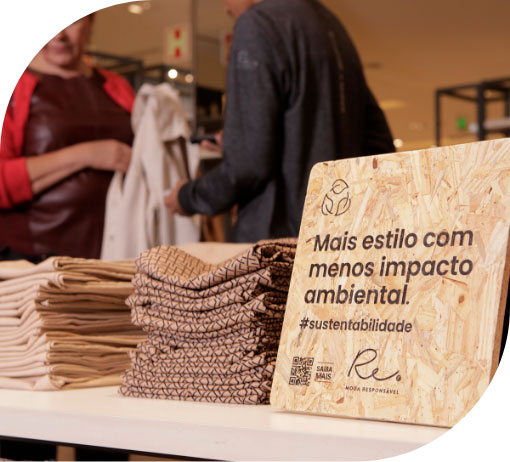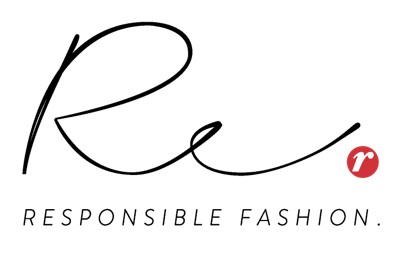We understand that the path to responsible fashion necessarily goes through building an offer of products and services that diminish environmental impact. At Lojas Renner S.A., responsibility is materialized by the YC Change (Youcom) seal and by Re Responsible Fashion seal (Renner), that identify products with raw materials or processes with a lower environmental impact and more added-value in the chain.


We launched the Re Responsible Fashion seal in 2018, to highlight our products made with less environmentally impacting raw materials and processes. In 2023, 80.5% of items sold by Renner were made from less impactful raw materials or processes.

The YC Change seal is present on products with a social impact and with responsible characteristics of Youcom, highlighting less impacting raw materials and processes.
More sustainable cotton
That is our way of referring to cotton farmed in a more sustainable way, taking care of the soil and of water; promoting local biodiversity; in addition to providing farmers with safe working conditions. We consider more sustainable cotton materials sourced by the Better Cotton* or Brazilian Responsible Cotton (ABR); organic, agriculturally-ecological or recycled.
To reach the target of 100% more sustainably sourced cotton by 2030, we have been working on training and aligning resale suppliers, supporting innovation and sectoral development, and engaging and raising awareness among our product teams, which even have creation goals of less impactful products linked to their variable remuneration in the year.
*We partner with Better Cotton to improve cotton cultivation globally. Currently, Better Cotton is purchased through a mass balance system, and is not physically traceable to the final product. However, farmers who grow cotton according to production principles and criteria benefit from demand for Better Cotton in volumes equivalent to what we sourced. Learn more about Better Cotton.
Viscose is an artificial fiber produced from cellulose – which comes from trees. At Renner, we are committed to offering less impacting, products, and for that reason, we encourage, in our chain of supply, practices of purchasing viscose that does not originate from native forests threatened by deforestation.
Modal and lyocell are also fibers from renewable sources and follow strict environmental standards during extraction and manufacturing.
In our supply chain, we encourage fiber purchase practices that do not originate from native forests threatened by deforestation.
We reached 92.9% of products made from wood fiber (viscose, modal and lyocell) with responsible origin and production, coming from suppliers with the best ratings in the evaluation of the Canopy Hot Button Report and documentary traceability.
Biodegradable Polyamide allows clothes to decompose in 3 years, when correctly discarded in landfills. The main applications are for the fashion industry, lingerie, sports apparel, beach attire, socks and accessories. As for recycled polyamide, it can be certified according to the Recycled Claim Standard (RCS) or the Global Recycled Standard (GRS).
Product developed based on the butia yatay leaf. Originating from sustainable handling and handcrafted.
Dyeing created based on natural dyes extracted from plants.
Leather has very little representation in our product mix, but we encourage our chain to use leather with some sort of production control, in accordance with the guidelines of the Leather Working Group (LWG) or of the Brazilian Leather Sustainability Certification (CSCB).
We use cloth containing recycled fiber. One of them is the PET fabric, originated from the transformation of PET bottles into polyester yarn through a special extrusion process. It can be recycled according to the Recycled Claim Standard (RCS) and the Global Recycled Standard (GRS).
The collection was produced with recycled fabric and zero-waste, in a partnership with the “Eu Visto o Bem” [Dressed for the Greater Good] Movement, supported by Lojas Renner Institute, for the empowerment of women incarcerated and out of the prison system.
The Responsible Packages Project is focused on mapping and building proposals for less impacting packages both for the environment and for society.
In 2021, we created pilot projects and initiatives for reducing the environmental impact in packages in stores, e-commerce and DCs, targeting the decrease of our consumption of single-use plastics. We are conducting several plastic replacement tests for promoting a change in processes.
Of the total packages used in our stores, Distribution Centers and e-commerce in 2021, 64% are paper/cardboard and 36% plastic. Packages in paper/cardboard, both in the DCs and in stores are 100% FSC1 certified. Of the plastic packages, 32% are recyclable.